
We see ourselves as among the premier promoters of the study of Caribbean civilization who, through our research, will create new insights and methodologies. We aim to create individuals aware of their identity and committed to community service, heritage management and region-centered historiography. We hope to increase the historical consciousness of Caribbean peoples and engender recognition of the importance of a knowledge of the past in policy formulation in the region.
We will continue to develop a research agenda, which will give insights into the region’s historical legacy and promote archaeological heritage management.Our research on the struggles and achievements of Caribbean peoples will help to develop confident and informed citizens.We will disseminate information and ideas to students and to the wider, national community through the use of appropriate technologies and methodologies.
Our courses cover the histories of Asia, Africa, Latin America, North America, Europe and the Caribbean. We seek to focus on a number of major areas that complement the already comprehensive range of courses available. These new foci will have as their objective the establishment of the Department and the Faculty as a major international centre in these particular areas:
Since the composition of Trinidad & Tobago's population makes our nation a natural laboratory for the study of the world’s peoples in one small space, we will promote synergies between African & Asian Diasporic studies areas.Our studies focus not only on movements to and from ancestral places, but equally on movements within the region, and from the region to North America and Europe.
As regional and hemispheric integration movements become increasingly important, this area of study will assume greater and greater significance. As this area’s importance grows over the next decade, Trinidad & Tobago's geographical position and its oil and gas reserves will offer much potential for its rise as a major bridgehead to Latin America.The Department, therefore, will position itself accordingly.
We seek to expand our focus beyond the English-speaking Caribbean to include the Spanish, French and Dutch Caribbean.We also seek to emphasise Cultural and Heritage Studies and consider the engagement with Digital History a primary objective.